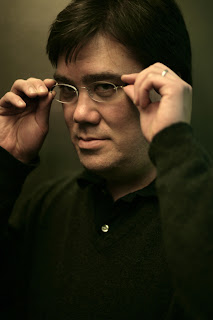Ringing iPhone stops New York Philharmonic.
by Paul Pelkonen.
 |
| He can kill your cell phone with his brain. New York Philharmonic Music Director Alan Gilbert. Photo by Pascal Perich © New York Philharmonic. |
Tuesday night's New York Philharmonic performance of the Mahler Ninth was stopped dead by an unusual instrument--the iPhone.
An iPhone (using the marimba ring-tone) went off repeatedly in the fourth movement of Mahler's final completed symphony.
According to an eyewitness, the offending phone owner was in the front rows of Avery Fisher Hall when his phone went off. (A post by Michael Jo on the classical music blog thousandfoldecho.com specifies that the interruption happened just 13 bars before the last page of the score.) In other words, in the final moments of a 25-minute movement, that ends a 90-minute symphony.
According to an eyewitness, the offending phone owner was in the front rows of Avery Fisher Hall when his phone went off. (A post by Michael Jo on the classical music blog thousandfoldecho.com specifies that the interruption happened just 13 bars before the last page of the score.) In other words, in the final moments of a 25-minute movement, that ends a 90-minute symphony.
"Mr. Gilbert was visibly annoyed by the persistent ring-tone, so much that he quietly cut the orchestra," the concert-goer, music student Kyra Sims, reports. She related how the orchestra's music director turned on the podium towards the offender. The pause lasted a good "three or four minutes. It might have been two. It seemed long."
Mr. Gilbert asked the man, sitting in front of the concert-master: "Are you finished?" The man didn't respond.
"Fine, we'll wait," Mr. Gilbert said.
The Avery Fisher Hall audience, ripped in an untimely fashion from Mahler's complicated sound-world, reacted with "seething rage," Ms. Sims said. Someone shouted "Thousand dollar fine."
This was followed by cries of 'Get out!' and 'Kick him out!.' Some people started clapping rhythmically but the hall was quieted down. House security did not intervene or remove the offender.
The ringing stopped. "Did you turn it off?" Mr. Gilbert asked.
The man nodded.
"It won't go off again?"
The man shook his head.
Before resuming, Mr. Gilbert addressed the audience. He said: "I apologize. Usually, when there's a disturbance like this, it is best to ignore it, because addressing it is sometimes worse than the disturbance itself. But this was so egregious that I could not allow it."
"We'll start again." The audience cheered.
"We'll start again." The audience cheered.
The final movement of this symphony (marked Adagio: Very Slowly and Restrained) is a long slow meditation on death that eventually fades to silence. The work has special significance at the New York Philharmonic, an orchestra that Mahler conducted in the last years of his life.
Mr. Gilbert turned to the orchestra and said "Number 118." (Again, thanks to thousandfoldecho.com for this detail.) The band picked up the movement from the final fortissimo ending in the brass, and played the work through to its last, quiet pages.




